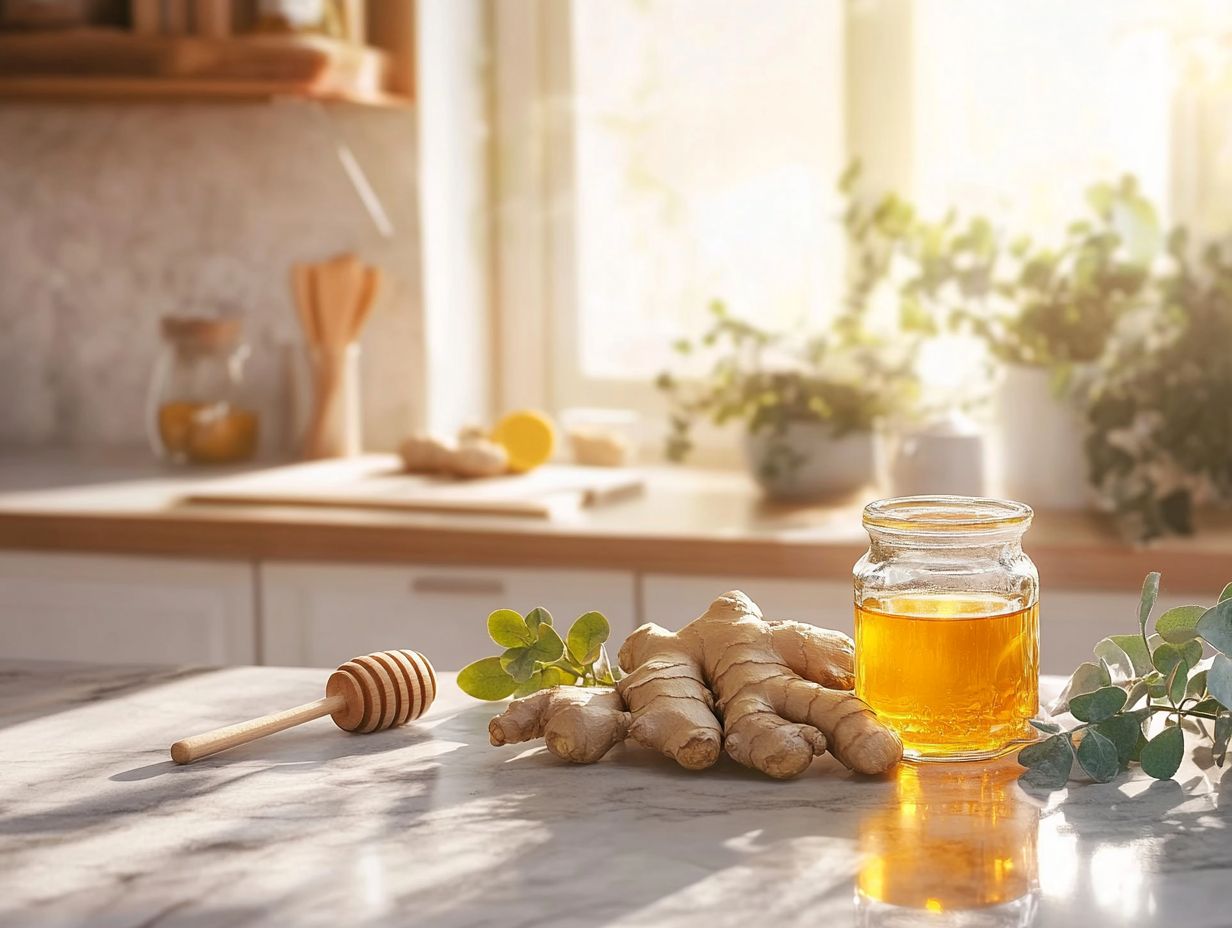Natural Remedies for Allergies
Allergies impact millions, transforming routine moments into daunting challenges. Grasping the nature of allergies and their development is your initial pathway to relief.
From natural remedies such as herbal supplements and acupuncture to lifestyle adjustments in your diet and environment, embracing a holistic approach can yield remarkable results. Get ready to explore diverse strategies that can change your life!
This article delves into diverse strategies for managing and preventing allergies, providing you with actionable tips to minimize exposure and enhance your immunity. Uncover how you can reclaim your comfort and well-being, navigating life with renewed ease.
Contents
- Key Takeaways:
- Understanding Allergies
- Natural Remedies for Allergies
- Lifestyle Changes for Managing Allergies
- Preventing Allergies
- Frequently Asked Questions
- What are natural remedies for allergies?
- What are some examples of natural remedies for allergies?
- Can natural remedies completely cure allergies?
- Are natural remedies safe to use for allergies?
- How long does it take for natural remedies to work for allergies?
- Can natural remedies be used alongside traditional allergy medications?
Key Takeaways:

- Herbal supplements and essential oils can help alleviate allergy symptoms due to their anti-inflammatory and immune-boosting properties.
- Acupuncture and acupressure can provide relief by targeting specific allergy triggers and promoting overall balance in the body.
- Making dietary changes, exercising regularly, and considering environmental factors can all contribute to managing and preventing allergies.
Understanding Allergies
Grasping the nuances of allergies is essential for effectively managing allergic rhinitis and its accompanying symptoms, which can profoundly influence your daily life.
Allergies arise when your immune system erroneously identifies a benign substance like pollen or dust mites as a threat, prompting an immune response. This reaction can manifest through a range of symptoms, such as nasal congestion, sneezing, and itching, highlighting your body s way of responding to perceived allergens.
Understanding this process equips you to navigate the challenges that allergies present with greater ease and insight.
What are Allergies and How Do They Develop?
Allergies represent an overactive immune response to substances known as allergens, which can range from food and pollen to dust, often leading to conditions like allergic rhinitis and a host of other symptoms.
This exaggerated reaction occurs when your immune system mistakenly identifies these typically harmless substances as threats. In response, your body releases histamines chemicals that cause allergy symptoms sparking inflammation and various symptoms like sneezing, itching, and swelling.
Common triggers can vary widely, often encompassing seasonal allergens such as pollen from trees and flowers, pet dander, house dust mites, and particular foods like nuts or shellfish. Over time, you may notice that your immune system ‘learns’ to recognize these allergens, which can lead to either heightened sensitivity or, in some cases, a degree of tolerance.
Grasping these physiological processes is crucial for managing allergies effectively.
Natural Remedies for Allergies
Natural remedies for allergies provide an elegant, holistic method for managing your allergy symptoms while supporting your immune health. These remedies work well with conventional allergy medications, creating a harmonious balance in your overall care strategy.
Herbal Supplements and Essential Oils

Herbal supplements and essential oils are remarkable natural antihistamines that can effectively reduce inflammation and alleviate allergy symptoms.
Among these, stinging nettle truly stands out for its ability to inhibit your body’s production of inflammatory compounds, making it a favored choice for tackling seasonal allergies. Then there’s butterbur, another impressive herb known for its capacity to diminish nasal congestion and other allergy-related issues, thanks to its powerful anti-inflammatory properties.
Adding quercetin, a flavonoid abundant in various fruits and vegetables, can significantly enhance your immune response by stabilizing mast cells to limit histamine release. When paired with vitamin C which also plays a vital role in strengthening immunity and combating inflammation these natural remedies create a robust strategy for managing allergy discomfort and promoting your overall wellness.
Your journey to allergy relief starts now! Start today and discover what relief feels like! Share your success stories with us!
Acupuncture and Acupressure
Discover how acupuncture and acupressure can help you fight allergies naturally! These practices target specific points in your body. They may reduce allergy symptoms like sneezing and congestion. Research indicates that by stimulating certain acupuncture points, you may enhance your immune response, leading to improved health outcomes. Many individuals who integrate these methods with traditional treatments discover that they not only relieve immediate symptoms but also build resilience against future allergic reactions.
This dual approach may provide you with a well-rounded strategy for managing allergies naturally while still benefiting from traditional medicine.
Alternative Medicine Approaches
Alternative medicine approaches present a wealth of natural remedies designed to help you manage allergies and find relief without the unwanted side effects of conventional medications.
Consider exploring homeopathic remedies, which are natural treatments that help your body heal itself. Options like Allium cepa for those pesky runny noses and Sabadilla for relentless sneezing can provide you with the support you need.
Incorporate dietary supplements like vitamin C and probiotics to boost your immune system. Options such as vitamin C, quercetin, and probiotics may enhance your immune response and ease allergy symptoms. If you’re among the seasonal allergy sufferers, adopting a diet rich in anti-inflammatory foods like fruits, vegetables, and nuts while cutting back on processed sugars and dairy could prove beneficial.
These holistic strategies work together to form a strong defense against the environmental triggers that often lead to discomfort.
Lifestyle Changes for Managing Allergies
Implementing lifestyle changes can profoundly elevate your ability to manage allergies while bolstering your immune health. This proactive approach gives you the power to effectively allergy-proof your environment, ensuring a more comfortable and resilient living space.
Dietary Changes and Exercise

Dietary changes and regular exercise are essential for enhancing immune health and effectively managing allergies.
By incorporating nutrient-rich dietary supplements into your balanced diet, you can amplify these benefits. Omega-3 fatty acids, found in sources like fish oil or flaxseed, work wonders in reducing inflammation and supporting respiratory health. Vitamin D supplements are crucial for immune function, particularly during those winter months when sunlight exposure is at a premium.
Probiotics, available in capsules or through fermented foods, can significantly boost gut health, which is intricately tied to immune responses and allergy management.
To complement these dietary adjustments, integrating physical activity into your daily routine can be effortless. Simple actions like opting for the stairs, taking a stroll during lunch breaks, or enjoying family sports can seamlessly blend into your lifestyle, enhancing your overall well-being while minimizing the impact of allergens.
Environmental Factors to Consider
Understanding how to manage environmental factors is crucial for immediate relief. Environmental factors play a significant role in influencing your allergy symptoms.
Incorporating HEPA filters into your air conditioning system does more than just cool your space; HEPA filters are special filters that trap small particles, including allergens, from the air. Establishing regular cleaning routines, such as dusting and vacuuming with HEPA-equipped devices, will further lessen potential triggers.
As a homeowner, keep an eye on pollen counts, especially during peak seasons. This could mean keeping your windows shut and using air purifiers when necessary. By paying attention to both your indoor air quality and outdoor conditions, you can create a safer haven from allergens that help you breathe easier.
Preventing Allergies
Preventing allergies requires a comprehensive strategy that combines proactive measures to minimize exposure to known allergens while simultaneously enhancing your immune system.
By taking these steps, you can create a more resilient environment for yourself, effectively reducing the likelihood of allergic reactions.
Tips for Reducing Exposure and Boosting Immunity
Implementing effective strategies to reduce your exposure to allergens can significantly enhance your quality of life.
These strategies also bolster your immune system.
Start by keeping your living spaces clean. Regular vacuuming with HEPA filters traps common allergens like dust mites and pet dander.
Invest in high-quality air purifiers to filter airborne particles. This ensures the air you breathe is fresher and cleaner.
Boost your immunity with foods high in antioxidants and omega-3 fatty acids! If seasonal allergies bother you, stay alert to pollen forecasts.
Keep your windows closed during high counts and limit outdoor activities at peak times for a noticeable improvement in your comfort and well-being.
Frequently Asked Questions

What are natural remedies for allergies?
Natural remedies use ingredients from nature to help ease allergy symptoms. They are often options alongside traditional medications.
What are some examples of natural remedies for allergies?
Examples include herbal supplements, acupuncture, essential oils, nasal irrigation, and dietary changes. These methods aim to boost the immune system and reduce inflammation in the body.
Can natural remedies completely cure allergies?
No, natural remedies cannot completely cure allergies. Allergies are caused by an immune response to specific triggers, and natural remedies can only alleviate symptoms. It is important to consult with a healthcare professional for proper diagnosis and treatment.
Are natural remedies safe to use for allergies?
Natural remedies can be safe to use, but it’s crucial to research and consult with a healthcare professional before trying any new treatment. Some remedies may interact with medications or may not be suitable for everyone.
How long does it take for natural remedies to work for allergies?
The effectiveness of natural remedies can vary for each individual, and it may take some time to see results. Some may experience immediate relief, while others might need a longer period to notice a difference.
Can natural remedies be used alongside traditional allergy medications?
Yes, natural remedies can complement traditional allergy medications. However, consult with a healthcare professional before combining treatments to avoid any potential interactions or adverse effects.




